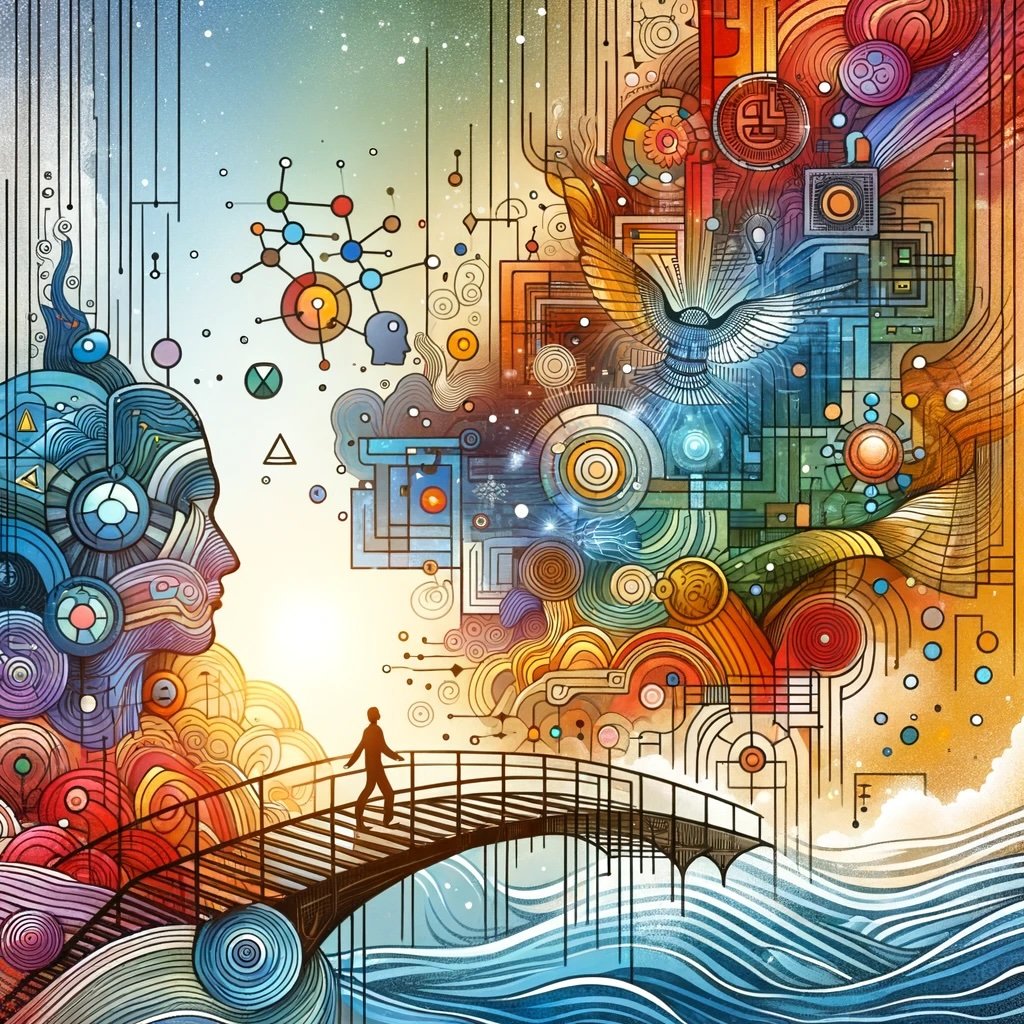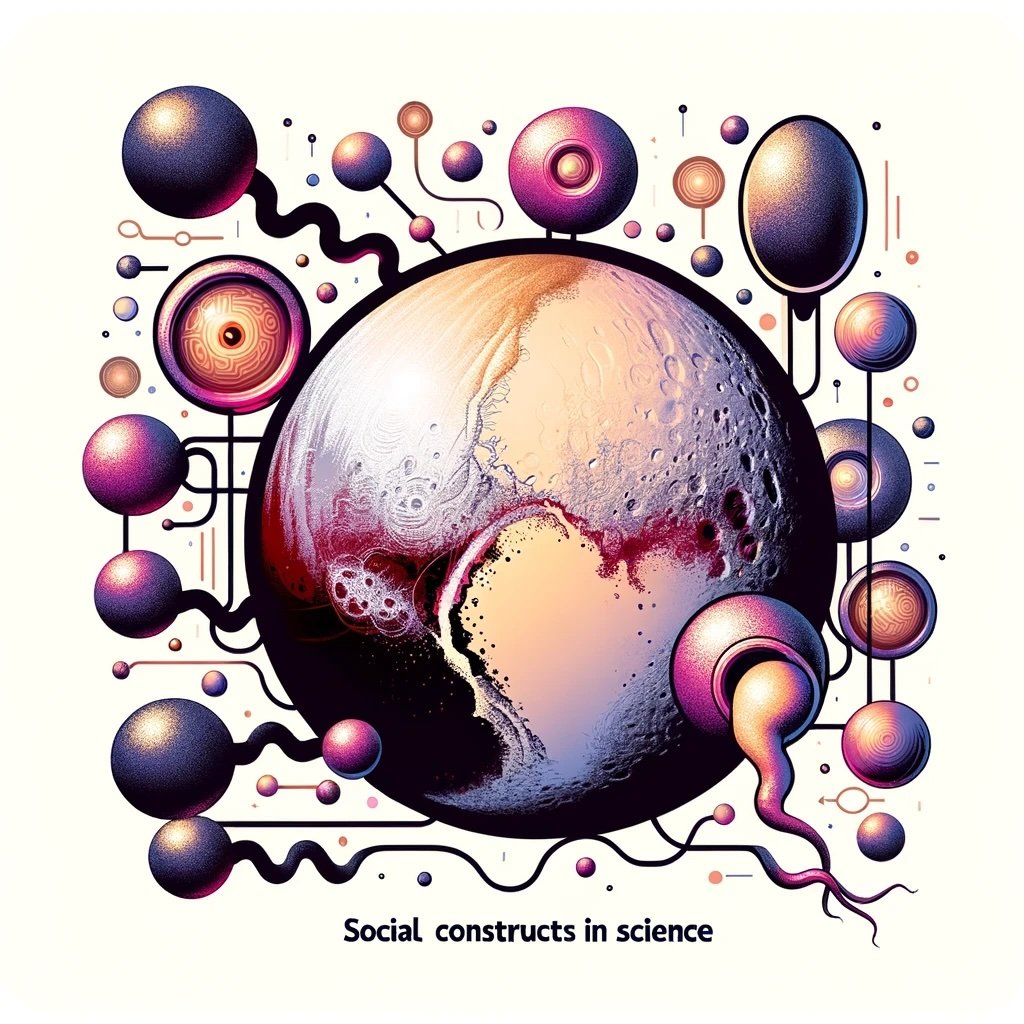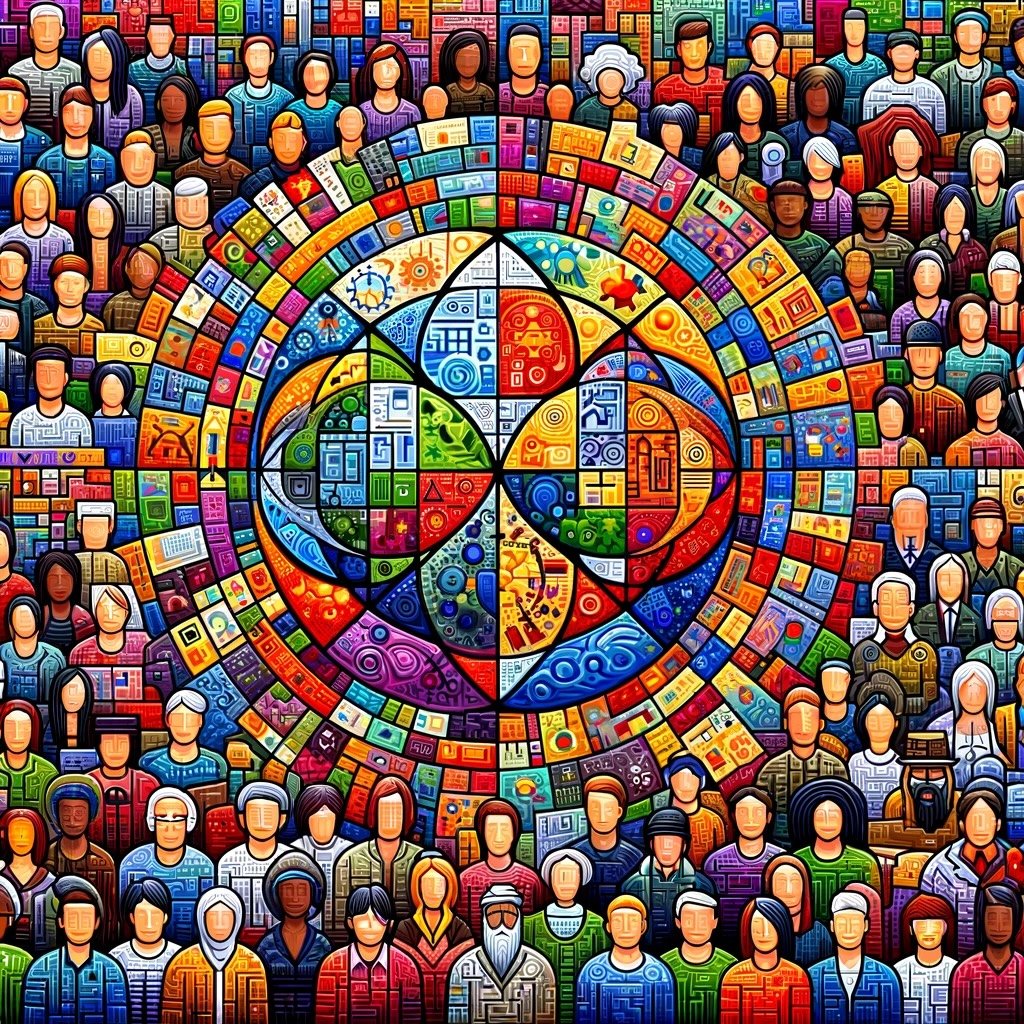Welcome to my blog!
Every morning, I begin with a cup of coffee and 15 minutes of free thinking. I write down everything that comes to mind, from new ideas to thoughts that emerged overnight. This is where I develop and refine my new research. You'll find some repetition and ideas still in progress. Some might seem unusual or unclear at first, but that's part of the journey! I'm excited to share how my ideas form and evolve.
Exploring the relationship between logic and language, and questioning whether this relationship ultimately leads to psychologism.
Examining the central role of language in Twentieth-century analytical philosophy and the relationship between language, thought, and logic.
Exploring the distinct roles of logic and mathematics in understanding material and conceptual coherence, and how each contributes to different domains of reasoning.
Examining the possibility of non-violent change in addressing epistemic oppression and the potential for a "quiet revolution" in rebalancing societal powers.
Exploring the limitations of traditional Marxist theory in addressing modern societal complexities and the emergence of epistemic powers that shape contemporary inequities.
Today, I have the great honour of having a friend and colleague, Dr. Padriac O'Leary, contributing to Logic in the Wild blog. Dr. O'Leary recently joined the Computer Science department at the University of Auckland after completing a Ph.D. in philosophy with Prof. Fred Kroon. Today, Padriac elaborates on the idea of "logical impressionism," delving into its role in preserving coherence in complex contexts and its distinction from formal logic and rhetoric.
Exploring the principle of the climber’s agreement in the climbing community and proposing a similar approach to coherence and understanding in logical discourse.
Exploring the intersection of social epistemology and logic, examining how knowledge and coherence are affected when perspectives are pooled in a community.
Boolean negation inherits the law of non-contradiction from mathematics, but does it also get the rule of explosion? Exploring the implications of Boolean negation for logical consistency and the potential for coherent reasoning in the presence of inconsistency.
Exploring how intersectionality challenges the concept of sex as a binary or spectrum and invites us to view it through a pluralistic manifold.
Exploring the intersection of practice and theory in logic, and how a richer approach enhances both.
Exploring Andrea Nye's critique of logic and the challenges of addressing gender symbolism in philosophical discourse.
Examining the historical exclusion of women from the domain of logic and how feminism reveals the unequal distribution of epistemic power and the fabrication of gendered reasoning.
Exploring how Ancient Greek notions of harmony reveal the essence of logical thinking as a pursuit of coherence, connecting music, mathematics, and the cosmos.
This post explores how the term ‘logic’ is used in various contexts, from political ideologies to natural processes, and questions whether it genuinely reflects logical reasoning in the scenarios it describes.
In this post, I explore the implications of the "Kiwi Before Iwi" slogan and its strict adherence to the logic of equality, questioning whether it truly serves justice or perpetuates inequality.
This post explores the distinctions between neutrality, equality, and equity in logical discourse, emphasizing the importance of creating a fair and inclusive space for dialectical enquiry. While neutrality aims for equal treatment, true equity ensures that all voices are heard and valued, preventing the erasure of marginalized perspectives.
This post explores David Lewis's theory of modal realism, which posits the existence of possible worlds to account for our modal discourse, and asks whether this view is coherent and cogent.
This post delves into the complex task of defining the self, examining the role of logic in providing coherence to our understanding of identity and presence in the world.
This post explores the intriguing connection between logical thinking and authenticity, suggesting that coherence rather than truth might be the key to understanding our true selves.
Exploring a concrete example of logic in everyday life, this post challenges the perception of logic as an emotionless, external tool. It highlights how logic protects us by guarding coherence in reasoning, rather than dictating surprising, non-human decisions.
This post explores the principle of charity in argumentation, emphasizing the importance of interpreting others' arguments generously and the role of logic in fostering charitable discourse.
This post explores the necessity of logic in community development, highlighting how logical interaction fosters a neutral space for dialectical enquiry, enabling diverse perspectives to find common ground without imposing majority beliefs.
In this post, I explore how epistemic structures, akin to Kuhn's scientific paradigms, can become oppressive logical monsters. These structures, passed down through generations, resist change and contribute to systemic injustice. Can seeking coherence in dialectical enquiry offer a path to overcoming cultural incommensurability and fostering better communication across paradigms? Is a Kuhnian analysis the right approach to understand epistemic oppression?
Short description: This post explores the concept of "emerging structural oppression," examining how power structures evolve and perpetuate systemic and epistemic oppression, with a focus on the role of logic in reinforcing these injustices.
his post explores how logic can be systemically oppressive, drawing on the works of Fricker, Dotson, and Mills to examine the intersection of epistemic injustice, white ignorance, and the inertia of dominant epistemic systems.
This post asks why we keep interrupting each other. Is it out of good intentions? Learn how a simple trick of posing uptake questions can help us do better.
This post explores the importance of engaging with a logical mindset in discussions, using a personal experience to illustrate how logical enquiry can foster constructive communication.
This post explores whether logical injustice is a distinct kind of injustice or if it is reducible to social injustice, drawing parallels with epistemic and hermeneutical injustices.
Examining the ways populism exploits incoherence and bad logic to make truth irrelevant, and the dangers this poses to political discourse.
Examining the possibility of non-violent change in addressing epistemic oppression and the potential for a "quiet revolution" in rebalancing societal powers.
Exploring the limitations of traditional Marxist theory in addressing modern societal complexities and the emergence of epistemic powers that shape contemporary inequities.
This post explores how the term ‘logic’ is used in various contexts, from political ideologies to natural processes, and questions whether it genuinely reflects logical reasoning in the scenarios it describes.
In this post, I explore the implications of the "Kiwi Before Iwi" slogan and its strict adherence to the logic of equality, questioning whether it truly serves justice or perpetuates inequality.
This post challenges the rapid-fire nature of social media interactions and proposes the concept of "logic duty" as a civic responsibility to deliberate on societal issues, encouraging deeper understanding and coherent decision-making beyond the divisive echo chambers.
This post explores how learning logic not only sharpens individual reasoning and debate skills but more importantly serves as a foundational tool for fostering societal cohesion and constructive dialogue.
This post discusses the nuanced question of whether accusations of racism can themselves be racially motivated, especially in light of recent criticisms by NZ political leaders against designated spaces for Māori and Pacifica students.
This blog addresses the contentious debate surrounding designated spaces for Māori and Pacifica students at The University of Auckland, refuting accusations of racism with a nuanced discussion on community, identity, and the tu quoque fallacy.
This blog post is a response to Winston Peters' "state of the nation" speech, focusing on his incoherent analogy between the Labour Party and Nazi Germany, and and denouncing his deployment of inflammatory demagogical rhetoric in prominent New Zealand's political discourse.
This post examines how demands for equity by marginalized groups are often misinterpreted as calls for special treatment, particularly when these groups are ethnic minorities, using a notable speech by Don Brash as a case study.
This post critiques the divisive rhetoric of New Zealand's political leaders, urging a more mature approach to discourse while preserving the passionate critique embedded in the original argument.
This post explores the nuanced dynamics of group versus individual accountability, particularly in historical and social justice contexts, emphasizing the complexity of attributing actions and consequences across different societal levels.
This post explores how the interpretation of the Treaty of Waitangi's translations can lead to a form of oppression through the imposition of foreign logical frameworks on Māori concepts, using the term 'tikanga' as a key example.
In this post, we examine abstract equality through logic and its potential to overlook the experiences of marginalized groups.
Exploring the value of a father's advice, "Shut up and listen!", this post urges leaders to embrace active listening in the context of Waitangi weekend.
This post explores how narrowing our focus from broad generalizations to specific groups reveals deeper truths and addresses social inequities.
Is societal justice about treating everyone identically, or does it demand a more nuanced, equitable approach?
This post explores the tension between logical neutrality and the erasure of individual identities in New Zealand's political landscape, examining the implications for Māori communities.
Exploring the crucial role of logical integrity in political decision-making, this post examines the varied application of logic in politics through the case of New Zealand Prime Minister Christopher Luxon's early actions and statements, emphasizing the need for consistent logical reasoning in governance.
This piece delves into the nuanced spectrum between competition and cooperation, questioning traditional views of these concepts and exploring their roles in both natural and human-made systems.
In this post, I explore the forest as a metaphor for competition and cooperation, contrasting the individualistic struggle for resources with the collaborative symbiosis of the ecosystem, and introducing relational ontology as a holistic view that transcends these dualities.
This blog delves into the concept of relational identity, drawing from Māori philosophy and Anne Salmond's work, to explore how identity extends beyond personal confines and encompasses a holistic network of relationships, particularly within the LGBTQ+ community.
Exploring the principle of the climber’s agreement in the climbing community and proposing a similar approach to coherence and understanding in logical discourse.
This post explores the principle of charity in argumentation, emphasizing the importance of interpreting others' arguments generously and the role of logic in fostering charitable discourse.
Exploring logical injustice, the post emphasizes the importance of using appropriate logical standards in everyday discussions and decision-making.
Drawing from the traditional principle of charity, I introduce the Principle of Logical Charity, encouraging the treatment of others' views as both intelligent and logically coherent in conversations.
In this blog post, I explore how my journey as a logician, initially focused on abstract content, evolved to embrace real-world interactions, from teaching diverse students to considering feminist critiques and the nature of metaphysics and mathematics.
Exploring the distinct roles of logic and mathematics in understanding material and conceptual coherence, and how each contributes to different domains of reasoning.
Exploring how Ancient Greek notions of harmony reveal the essence of logical thinking as a pursuit of coherence, connecting music, mathematics, and the cosmos.
This post explores how the term ‘logic’ is used in various contexts, from political ideologies to natural processes, and questions whether it genuinely reflects logical reasoning in the scenarios it describes.
This post delves into the complex task of defining the self, examining the role of logic in providing coherence to our understanding of identity and presence in the world.
This post explores the intriguing connection between logical thinking and authenticity, suggesting that coherence rather than truth might be the key to understanding our true selves.
Exploring a concrete example of logic in everyday life, this post challenges the perception of logic as an emotionless, external tool. It highlights how logic protects us by guarding coherence in reasoning, rather than dictating surprising, non-human decisions.
his post explores how logic can be systemically oppressive, drawing on the works of Fricker, Dotson, and Mills to examine the intersection of epistemic injustice, white ignorance, and the inertia of dominant epistemic systems.
This post explores whether logical injustice is a distinct kind of injustice or if it is reducible to social injustice, drawing parallels with epistemic and hermeneutical injustices.
This blog post introduces the concept of logical injustice, exploring its parallels with epistemic and hermeneutical injustices, and discusses how failing to appreciate the coherence in someone's thoughts constitutes this new form of injustice.
In this blog post, I propose the rule of trivialisation as a generalisation of the logical rule of Explosion, and I discuss difficulties in finding practical ways of using it. I question whether absurdity could provide a new metric for assessing logical coherence.
This blog post discusses the rule of explosion in logic, which posits that from any contradiction, everything follows—resulting in what is known as triviality. I explore the limitations of this principle and introduce a nuanced approach termed 'trivialisation' that seeks to redefine how we measure coherence without insisting on strict consistency.
This blog post explores the intricate relationship between logical and conceptual choices, questioning whether decisions based solely on definitions can exist independently of logical connections, and how logic imposes boundaries on conceptual behavior.
This blog post discusses the principle of explosion in logic, exploring how it traditionally mandates that any contradiction leads to everything becoming true, and why some modern logicians choose to reject this rule to handle inevitable contradictions more gracefully.
This post examines how logic extends beyond mere truth-seeking, illustrating its role in understanding coherence in historical scientific theories and contemporary societal debates, from ancient optics to modern sports equity.
This post examines the transition from the symbolic complexities of logic to its practical applications in daily life, questioning how deeply the principles of logical theory influence our everyday reasoning.
Exploring the role of logic in enhancing personal understanding and improving community interactions, facilitating a bridge between differing perspectives.
This post explores the deep-seated issues of epistemic injustice faced by queer and trans individuals, highlighting the pivotal role of language and community in affirming identity and the dire consequences of its absence.
This blog post is a response to Winston Peters' "state of the nation" speech, focusing on his incoherent analogy between the Labour Party and Nazi Germany, and and denouncing his deployment of inflammatory demagogical rhetoric in prominent New Zealand's political discourse.
In this post, the Logic in the Wild framework is employed to refresh feminist critiques of logic, steering away from evolutionary simplifications and gender symbolism errors.
Exploring a friend's journey with Jesus, this post reveals how his faith leads to a profound appreciation for the beauty in every individual, transcending traditional religious divides.
This post explores the ethical implications of logical coherence through the lens of Viktor Bout's life, illustrating how logic's misuse can lead to morally questionable outcomes.
Exploring the value of a father's advice, "Shut up and listen!", this post urges leaders to embrace active listening in the context of Waitangi weekend.
Can harmony be considered as a guardian of coherence?
This post explores the intersection of logic and empathy in understanding others, highlighting the limitations of empathy in our socially fragmented world and the role of logic as a 'guardian of coherence'.
In this post, I explore how changing content in a farcical setting, as shown in "Happiest Season," dramatically shifts its narrative impact from comedy to tragedy, prompting reflection on what this teaches us about logic and coherence when contexts are altered.
In this post, I examine Barbie's pearl of wisdom from her latest movie, revealing the enriching balance between logic and emotion.
o conclude a provocative blog week, this post defends dialetheism, weaving together this unique philosophical perspective with the ideas of validity as a social construct and logical nihilism.
Revisiting the concept of validity as a social construct, this post incorporates insights from Gillian Russell and logical nihilism, enhancing the understanding of logic as 'the guardian of coherence' in 'Logic in the Wild'.
Logic in the Wild argues against the conventional formal/informal logic divide, showcasing logic as a multifaceted guardian of coherence across various domains.
Exploring the crucial role of logical integrity in political decision-making, this post examines the varied application of logic in politics through the case of New Zealand Prime Minister Christopher Luxon's early actions and statements, emphasizing the need for consistent logical reasoning in governance.
This post explores the intersection of logic and empathy in understanding others, highlighting the limitations of empathy in our socially fragmented world and the role of logic as a 'guardian of coherence'.
o conclude a provocative blog week, this post defends dialetheism, weaving together this unique philosophical perspective with the ideas of validity as a social construct and logical nihilism.
This post examines the challenging demands of empathy in a polarized world and proposes logic as a vital tool to bridge understanding and foster empathy amidst diverse viewpoints.
Explore how the social constructs of sex, race, homosexuality, and heterosexuality are shaped by societal norms and scientific inquiry, revealing the intricate ways in which our understanding of identity is formed and challenged within the evolving landscapes of society and science.
Exploring the intricate link between gender identity and biological sex, this post investigates how societal constructs around 'man/woman' influence our understanding of the 'male/female' distinction. It questions the origins of social pressure that shapes our perceptions, challenging us to rethink the boundaries between biological realities and cultural expectations.
Highlighting the realization that societal pressures can lead science to alter its definitions, this post ventures into the intricate relationship between biology, astronomy, and the social constructs of sex and planetary classification.
Today, I have the great honour of having a friend and colleague, Dr. Padriac O'Leary, contributing to Logic in the Wild blog. Dr. O'Leary recently joined the Computer Science department at the University of Auckland after completing a Ph.D. in philosophy with Prof. Fred Kroon. Today, Padriac elaborates on the idea of "logical impressionism," delving into its role in preserving coherence in complex contexts and its distinction from formal logic and rhetoric.
Exploring the relationship between logic and language, and questioning whether this relationship ultimately leads to psychologism.
Examining the central role of language in Twentieth-century analytical philosophy and the relationship between language, thought, and logic.
Examining the possibility of non-violent change in addressing epistemic oppression and the potential for a "quiet revolution" in rebalancing societal powers.
Exploring the limitations of traditional Marxist theory in addressing modern societal complexities and the emergence of epistemic powers that shape contemporary inequities.
Exploring the intersection of social epistemology and logic, examining how knowledge and coherence are affected when perspectives are pooled in a community.
Boolean negation inherits the law of non-contradiction from mathematics, but does it also get the rule of explosion? Exploring the implications of Boolean negation for logical consistency and the potential for coherent reasoning in the presence of inconsistency.
Exploring the intersection of practice and theory in logic, and how a richer approach enhances both.
Exploring Andrea Nye's critique of logic and the challenges of addressing gender symbolism in philosophical discourse.
Examining the historical exclusion of women from the domain of logic and how feminism reveals the unequal distribution of epistemic power and the fabrication of gendered reasoning.
Exploring how Ancient Greek notions of harmony reveal the essence of logical thinking as a pursuit of coherence, connecting music, mathematics, and the cosmos.
This post explores David Lewis's theory of modal realism, which posits the existence of possible worlds to account for our modal discourse, and asks whether this view is coherent and cogent.
This blog post explores the role of logic as an epistemic tool, clarifying that while it does not directly determine truth, it is crucial in structuring knowledge. The discussion also touches on the concept of epistemic injustice and how denying logical tools can perpetuate systemic biases.
This post challenges the rapid-fire nature of social media interactions and proposes the concept of "logic duty" as a civic responsibility to deliberate on societal issues, encouraging deeper understanding and coherent decision-making beyond the divisive echo chambers.
This post examines how logic extends beyond mere truth-seeking, illustrating its role in understanding coherence in historical scientific theories and contemporary societal debates, from ancient optics to modern sports equity.
This post explores the perceived divide between the complex theories of formal logic and the practical logic we employ daily, bridging the gap between specialized academic knowledge and everyday reasoning.
This blog post explores Miranda Fricker's concept of testimonial injustice, examining whether epistemic injustice is appropriate unless knowledge is somehow objective.
Exploring a friend's journey with Jesus, this post reveals how his faith leads to a profound appreciation for the beauty in every individual, transcending traditional religious divides.
Exploring the depth of coming out, this post argues it encompasses far more than sexual preferences, embodying a rich identity and presence within the community.
Demonstrating how logic, as the guardian of coherence, directly led to the invention of the modern computer, transforming abstract theories into the foundation of today's technology.
This post explores classical logic, not as the logic of ancient times, but as a twentieth-century European development, focusing on its evolution from public debate tools to the formal languages shaping modern mathematics.
This post challenges the conventional understanding of evolutionary success, exploring the logical fallacies often embedded in patriarchal frameworks of biological interpretation.
This blog post challenges the prevalent notion that logic is alien to human nature, suggesting instead that it is an intrinsic tool evolved from our limitations.
After watching "Oppenheimer," a film about a pivotal scientific development, I'm inspired to share a thought-provoking quote from Rev. Māori Marsden's "The Woven Universe," offering a unique perspective on this historical moment.
In this post, I explore how changing content in a farcical setting, as shown in "Happiest Season," dramatically shifts its narrative impact from comedy to tragedy, prompting reflection on what this teaches us about logic and coherence when contexts are altered.
This post explores the challenges and potential solutions in addressing intersectional oppression through the lens of top-down and bottom-up logical approaches, inspired by the limitations of ceteris paribus logic in social contexts.
Exploring the WSCM equation, this post navigates through how upward and downward dynamics of oppression and privilege redefine intersectionality and call for a unified approach to social justice.
This post challenges the long-standing myths that marginalized groups possess lesser intellect, using intersectionality to highlight the absurdity of such claims.
This post explores the tension between logical neutrality and the erasure of individual identities in New Zealand's political landscape, examining the implications for Māori communities.
I examine the 'same logic, same response' slogan, focusing on its limitations.
“Kiwi Before Iwi” and the Logic of Equality
In this post, I explore the implications of the "Kiwi Before Iwi" slogan and its strict adherence to the logic of equality, questioning whether it truly serves justice or perpetuates inequality.
In New Zealand, the slogan “Kiwi before iwi” comes from a speech delivered by Don Brash in 2004, where he argued that the government should treat everyone equally. According to Brash, measures targeted specifically at Māori people grant them privileges that others do not benefit from. Instead, he believed that government policies should apply to everyone equally, meaning good measures or policies should also apply to Māori people without treating them in a special way. This is the logic of equality: everyone should be treated equally and have the same opportunities.
I wasn’t aware of this slogan in New Zealand until it resurfaced in government discourse 20 years later, like a vampire resurrected to haunt the community. It reappeared recently with Seymour and Peters, responding to affirmative action aimed at uplifting the mana of Māori people in the health system. They even equated designated spaces for Māori and Pacifika students at the University of Auckland to Apartheid, as if providing a safe space for a group of students was like preventing an entire population from accessing public services like education. Peters went as far as saying that the Labour government and its affirmative actions are akin to Nazi Germany.
The logic of equality, taken in a strict sense, leads to these catastrophic conditions. Imagine a family with children: one is a successful citizen with a high income, while another requires full-time assistance due to a health condition and cannot work or fend for themselves. Is it unjust for the parents to provide for the latter child and not give equally to the wealthier one? If the parents spend money on the child in need, must they give the same amount to the rich child to ensure equal treatment? Or should they only provide for the child in need with measures that also benefit the rich child? Using Peters' inflammatory logic of equality, are the parents like Nazis because they provide special care for their child in need?
Normally, I would think asking this question is uncharitable and creates a strawman of Peters’ view. Surely he doesn’t believe in such a strict reading of the logic of equality! I’m afraid he’s committed to it, however, because he has applied it unrestrictedly. The logic of equality is not only about caring for all Kiwis equally but also about considering measures that apply to disembodied individuals—neutral beings with no special identity or needs. If you generalise the “Kiwi before iwi” slogan to characterise the logic of equality, what do you get? “Individual before people”? “The one before the many”?
Neutrality vs Equality vs Equity
This post explores the distinctions between neutrality, equality, and equity in logical discourse, emphasizing the importance of creating a fair and inclusive space for dialectical enquiry. While neutrality aims for equal treatment, true equity ensures that all voices are heard and valued, preventing the erasure of marginalized perspectives.
In Logic in the Wild, I present logic as the guardian of coherence and compliment it for providing a “neutral space of dialectical enquiry.” Guarding coherence requires attention to structure and reasoning rather than belief and content. Engaging in a neutral space of dialectical enquiry is to focus on coherence rather than content when contemplating various perspectives on the same issue, alone or with others. Focus on how they reason, not what they believe. Being neutral means, in particular, that no one’s opinion or belief is imposed on the space, that no one is forced to accept as true what they don’t believe in.
Engaging neutrally requires the suspension of strong opinions and beliefs for the sake of the enquiry. If, when engaging with fiction, the audience is sometimes required to suspend disbelief, which means accepting things they wouldn’t accept in real life, such as superheroes, monsters, or interstellar space travel (do you believe in it?), suspending belief in a dialectical space is not similarly being more gullible, but rather suppressing one’s beliefs unless they can be justified and shared. If you want others to adopt a belief in a neutral space, you need to motivate and argue for it. How does it benefit others in the same space? How is it better for the group? And if others have views they want to support, hear them out with a charitable ear, seeking coherence and conciliation.
That’s the positive side of neutrality, that it allows us to play on an equal field, one in which everyone is treated equally. Equality, however, doesn’t guarantee equity. That’s true in real life, that even though we pretend that everyone has equal opportunity in society, only some achieve fair outcomes, sometimes because of luck and hard work, but most often because of their situation in society, which allows them to ignore or overcome barriers that stop others not similarly situated.
I believe the same can happen in a dialectical enquiry, that imposing neutrality without concern for fairness leads to an equal but non-equitable space. Some need to give up a lot more than others to enter that space, their voices get silenced because they can’t find a neutral way to express them, and their identity gets erased and so do the richness and wisdom of what they have to contribute. This can indeed happen deep in accepted standards of reasoning, which favor orthodoxy over difference by seeking equality, thus failing to achieve equity and fairness.
Logic and the Pursuit of Equality: A Critical Examination
In this post, we examine abstract equality through logic and its potential to overlook the experiences of marginalized groups.
In his recent "State of the Nation" address on January 28, New Zealand ACT leader David Seymour, a part of the current government coalition, emphasized the importance of treating all individuals equally as human beings. He stated, "We accept that if government policy doesn't treat all people equally as human beings, then we will gradually find division becomes the norm." He also expressed his belief in "universal humanity," emphasizing the same rights and dignities for every person and highlighting its role in historical social rights movements such as votes for women, the civil rights movement in America, and the end of apartheid in South Africa, among others.
While I won't delve into the idea that "universal humanity" has driven social rights movements, I'm interested in exploring the concept of abstract equality. This is significant because logic provides a framework for articulating how abstract equality can be achieved through neutrality.
In "Logic in the Wild," I defend the perspective that logic acts as the "guardian of coherence" and offers a "neutral space of dialectical enquiry." Neutrality, in the context of logic, implies detachment from content, enabling us to focus on the structural aspects of arguments, beliefs, or theories independently of their subject matter. Being logical doesn't hinge on truth, reasonableness, or sensibility; rather, it demands that beliefs are held coherently.
Seeking neutrality in communication and within the community holds numerous practical advantages. Neutrality facilitates abstraction, leading to universality and generality. Logically true statements, or tautologies, are assertions that cannot possibly be false, such as the claim that everything is either human or not. While this logical lens may render everything equal, it also strips away richness and diversity.
However, the challenge arises when we attempt to achieve social equality solely through abstraction and neutrality. This approach risks erasing the specific experiences of marginalized groups, those that are often subjugated under the banner of "universal humanity." While individuals like Seymour, positioned in places of power, may see equality through neutrality as a liberating force for fairness and justice, their own identities remain largely intact in this pursuit. This is because they already enjoy the "same rights and dignities" that they believe should be extended to everyone.
I have concerns about the rhetoric of equality used by politicians who advocate for erasing identities as the path to a just society. This approach may inadvertently overlook the unique challenges faced by marginalized communities. Achieving true equality requires us to navigate the delicate balance between embracing universality and acknowledging the importance of individual identities and experiences.
Iwi Before Kiwi: Uncovering the Hidden Depths in Societal Generalizations
This post explores how narrowing our focus from broad generalizations to specific groups reveals deeper truths and addresses social inequities.
When you make a true statement about everything, and I'm talking about 'Everything everything,' you're likely to end up with mere platitudes. Take, for example, the assertion that everything either exists or doesn't. This applies to me, my cat, and, well, everything. But consider the claim that everything is part of everything. This seems valid, but only if we're interpreting 'everything' in a consistent manner (note the play on different meanings of 'everything'). Admittedly, this isn't particularly exciting. My argument here is that general statements encompassing everything tend to be low on information.
Now, let's shift our focus to general statements about a narrower set, like humans. Suddenly, we're able to make more interesting observations: every human has a heart, humans inhabit Earth, and our survival depends on water. The narrower the group, the more specific and informative our statements can be. Consider children: all children are younger than 30 years old, and no child under 5 can drive a car. Surely, you can think of numerous other examples. The pattern here is clear – by focusing on increasingly specific groups, we gain more meaningful information. Conversely, the larger the group, the fewer statements apply universally to all its members. This reality underscores how marginalized groups are often erased in broad, sweeping statements that aim to encompass everyone.
An example of this is the phrase 'Kiwi before iwi'. When New Zealand Prime Minister Luxon speaks of unity and inclusivity for all Kiwis, his intention might be to promote governance that is equitable for all. However, such a stance inadvertently neglects the unique identities and lived experiences of marginalized groups. The systemic disparities between the majority of Kiwis and marginalized groups, such as Māori or LGBTQ+ people, become apparent only when we consider these subgroups separately. Broad generalizations about all Kiwis tend to obscure the specific statistics and insights necessary for achieving equity and social justice.
There's a logical imperative to explore different domains of quantification if we want to uncover informative generalizations that can help propel our country forward. We must recognize that, at times, prioritizing 'iwi before Kiwi' is essential for fostering a just society.
One vs All: Equitable Justice vs Identical Treatment
Is societal justice about treating everyone identically, or does it demand a more nuanced, equitable approach?
If you found yourself as the sole survivor in a world devoid of other humans, your actions would be unbound by the typical constraints of morality. Social justice issues wouldn't come into play in such a solitary existence. This scenario, while intriguing, isn't one I'd wish upon anyone. The prospect of being the last human being, in what would cease to be a society, is a bleak one.
However, this thought experiment highlights a fundamental truth: fulfilling all our needs independently is unattainable, given our intrinsic nature as social beings. Living in groups, as we do, means our preferences, desires, and needs will inevitably intersect and, at times, conflict. This necessitates a process of negotiation within our families, communities, and broader society. We strive to find ways to meet everyone's needs while preventing oppression and exploitation.
In a small group, a simple majority rule might seem effective. Yet, this system fails when the majority's decisions adversely affect the marginalized groups. Consider a household of three where a strict majority rule is applied: if two decide that the third person should undertake all cooking duties, the arrangement becomes unjust. As we scale this concept to larger communities and societies, the potential for majority-driven oppression grows significantly. What happens, for example, when a majority dictates that a subgroup should be enslaved for labor?
Conversely, there's the issue of a minority or a dictator wielding excessive power, leading to the oppression of the majority through violence and fear. But that's a topic for another discussion. Here, I'm concerned with the majority's perception that focusing on societal issues faced by marginalized groups, and seeking redress for these issues, somehow diminishes the majority. This viewpoint overlooks the fact that striving for a just distribution of goods and rights in society is not necessarily at the expense of individuals.
If social measures only cater to every individual equally, systemic and societal issues affecting marginalized groups may be overlooked, no matter their severity. For instance, we could tackle class disparities and the economic divide between rich and poor, yet still leave a subgroup in extreme poverty if they are too small to influence the broader movement. This is why the New Zealand government's call to work for "every Kiwi" raises concerns. It suggests that measures benefiting each individual equally are the hallmarks of a just society. However, identifying, acknowledging, and correcting the injustices experienced by various marginalized groups is essential for the entire community to thrive and evolve into a more equitable society.
So the pursuit of social justice and individual rights requires a nuanced understanding that extends beyond simple equations of equality. This involves not only addressing the broader societal issues but also giving due attention to the unique challenges faced by marginalized groups. The goal is to create a harmonious society where the needs of both the majority and marginalized groups are met, fostering a community where every individual, regardless of their group affiliation, has the opportunity to thrive. This approach, focusing on equitable treatment rather than identical treatment, is crucial for building a more just and inclusive society.
"Kiwi before iwi": Exploring Logic and Identity in New Zealand's Political Landscape
This post explores the tension between logical neutrality and the erasure of individual identities in New Zealand's political landscape, examining the implications for Māori communities.
This weekend, a significant gathering occurred: a hui attended by 10,000 people, convened by Kiingi Tuheitia, the Māori King. The purpose was to address the Coalition Government's policies on te reo and the Treaty of Waitangi. NZ First MP Shane Jones made a statement to Newshub: "The Government is focused on the interests of every single Kiwi rather than every single iwi." This sentiment echoes the old dichotomy of “Kiwi vs iwi” or “Kiwi before iwi”.
In my book, "Logic in the Wild," I argue that logic provides a neutral space for dialectical inquiry. However, there's a darker aspect to this abstraction: it can lead to the erasure of individual identities. The National government's stance of governing for “every” Kiwi ostensibly aims to unite rather than divide, suggesting that equality at the individual level avoids exclusion or favouritism. In logical terms, when the government speaks of “every Kiwi”, they are quantifying over individuals. To attain equality at this granular level, individuals must be rendered as neutral as possible.
As a logician, I am well-versed in this practice of generalising across domains. Logic aims for such a degree of generality that the entities within its domains of quantification become arbitrary. This is akin to a method in science, which I discuss in "Logic in The Wild," called ceteris paribus reasoning. This method abstracts away from interfering factors when formulating laws. For example, when Newton formulated his laws of motion, he idealised the scenario to just two bodies, a “sun” and a “planet,” treating them as mathematical points rather than celestial bodies.
This approach, while achieving generality, necessitates the erasure of individual specificity, treating entities as mere points. Members of parliament who advocate for an individualistic neo-liberal society find comfort in this “every Kiwi” domain, as their identity and social circumstances already align with the required neutrality. However, the challenges faced by iwis and Māori in our society are not evenly distributed among individuals. Systemic oppression manifests in various forms – poverty, health issues, substance abuse, severe mental health problems – and these are not uniformly experienced. This oppression cannot be reduced to the sum of individual experiences; it operates at a group level.
Thus, striving for neutrality at the individual level, as encapsulated in the phrase “every Kiwi”, inadvertently suppresses the recognition of oppression that affects iwis. It erases identities that are crucial to understanding the lived experiences of those facing oppression, forcing them into a framework of neutrality that is alien to their reality.
Neutrality Against Equality: A Dialectical Dilemma
How does the neutrality of logic fail to produce equality in dialectical enquiry?
In yesterday's post, I raised a question: does the neutrality or even impartiality of a dialectical space of enquiry necessarily lead to equality? This is a question worth delving deeper into. Let's consider this: How can a neutral and impartial dialectical practice possibly not treat its participants equally? Or, more specifically, how can such a practice fail to offer equal access to enquiry despite its neutrality and impartiality?
Initially, I treated neutrality and impartiality together to contrast them with the concept of equality, noting their distinct roles in dialectical spaces. It's crucial to distinguish between these terms to avoid potential misinterpretation. Impartiality primarily concerns the behavior and psychology of the interlocutors — their capacity to identify and mitigate their own biases and prejudices in judgment. It speaks more to the dynamics between individuals rather than to the inherent qualities of the enquiry space itself. Neutrality, in contrast, can be inherent to the space of enquiry itself, serving as a characteristic that emphasizes logical structure over content. This distinction underscores that while impartiality is about people and their interactions, neutrality is about the very nature of the enquiry space. Recognizing the importance of this distinction, my focus will be primarily on exploring the concept of neutrality and its implications.
The critical question then becomes: How can a neutral dialectical practice fail to provide equal access to enquiry? The type of neutrality in question here is that offered by logic, which involves abstracting from the content of beliefs or theories and concentrating on structure. As I argue in "Logic in the Wild," maintaining coherence neutrally means seeking good logical patterns in reasoning, regardless of content. Examples abound where arguments are logical, irrespective of whether their components are true or false. In theory, as long as the enquiry is predominantly logical, any content is permissible. This includes everything from ancient optics, which visualized beams emanating from the eyes to perceive the world, to alien abduction narratives, all of which can be as logically coherent as the most established modern scientific theories. How then does this not foster equality?
There are two key ways this occurs:
1. Insights from critical theory (encompassing feminism, queer theory, race theory, and post-colonial theory) suggest that societal biases are so pervasive and systematic that they lead practitioners to believe they are reasoning without assumptions, when in fact they are enforcing deep-rooted doxastic commitments in their dialectical enquiry.
2. Logic itself harbors inherent assumptions in the rules and laws it upholds, potentially creating a form of epistemic injustice by disallowing views that challenge these assumptions. A notable example from recent decades is the emergence of paraconsistent logics, which accommodate inconsistent theories. Orthodox twentieth-century logic equates inconsistency with triviality — an ultimate absurdity. However, scholars exploring indigenous philosophies have recognized that these worldviews often necessitate a tolerance for some inconsistency due to the conceptual spaces in which they operate. If a dialectical space of enquiry does not accommodate inconsistency due to its logical standards, despite claiming neutrality, it risks excluding alternative conceptual frameworks under the guise of triviality. This exclusion inevitably leads to inequality.
This issue presents a profound challenge. The rise of paraconsistent logics, which permit inconsistency, starkly contrasts with the orthodox view of twentieth-century logic where inconsistency was synonymous with triviality. This shift is significant, especially for scholars interpreting indigenous philosophies. These philosophies often require an acceptance of certain inconsistencies, which traditional logical frameworks might dismiss as trivial. If our dialectical spaces, governed by these orthodox logical standards, reject inconsistency, they inadvertently marginalize these alternative conceptual frameworks, perpetuating inequality.
Such a scenario illustrates a deep and ongoing problem in the field of logical enquiry: the potential for epistemic injustice rooted in the very foundations of logic. This is a dilemma that will continue to engage and challenge my thoughts for some time to come.

























































































Examining the ways populism exploits incoherence and bad logic to make truth irrelevant, and the dangers this poses to political discourse.